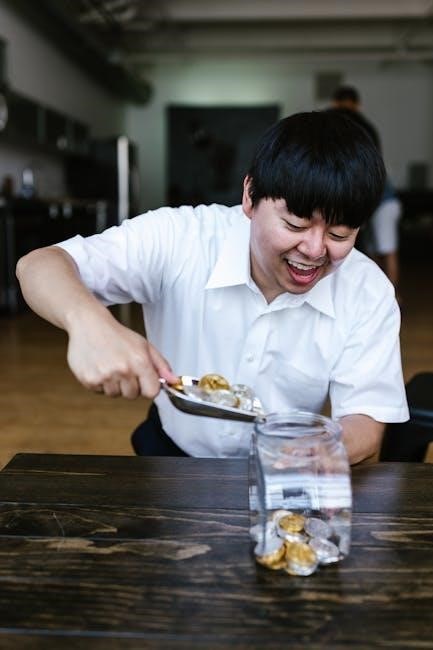Coin collecting, or numismatics, is the hobby of gathering and studying coins․ It offers a fascinating way to explore history, art, and global economics, providing a rewarding pastime for enthusiasts of all ages․
1․1 What is Coin Collecting?
Coin collecting, or numismatics, is the hobby of gathering, studying, and preserving coins from various periods and regions․ It combines history, art, and economics, making it a fascinating pursuit․ Collectors often seek rare, limited-edition, or historically significant coins․ The hobby appeals to both casual enthusiasts and serious investors, as coins can appreciate in value․ Whether focused on ancient coins, modern currency, or error coins, numismatics offers endless diversity․ It also serves as an educational tool, teaching about cultures, monetary systems, and historical events․ Many collectors enjoy the thrill of the hunt, while others appreciate the artistic and craftsmanship aspects of coins․ This versatile hobby fosters learning, enjoyment, and community building among enthusiasts worldwide․
1․2 Types of Coins for Collecting
Coin collecting encompasses a wide variety of categories, catering to different interests and budgets․ Common types include ancient coins, modern circulating coins, bullion coins, commemorative coins, error coins, and rare or limited-edition issues․ Ancient coins highlight historical civilizations, while modern coins showcase artistic designs and cultural themes․ Bullion coins, like gold or silver coins, attract investors due to their precious metal content․ Commemorative coins honor events or figures, often with unique designs․ Error coins, featuring minting mistakes, are sought after for their rarity․ Collectors may also focus on coins from specific countries or time periods, such as Roman, Greek, or medieval coins․ Each type offers unique appeal, allowing collectors to specialize or diversify their collections based on personal preferences and goals․
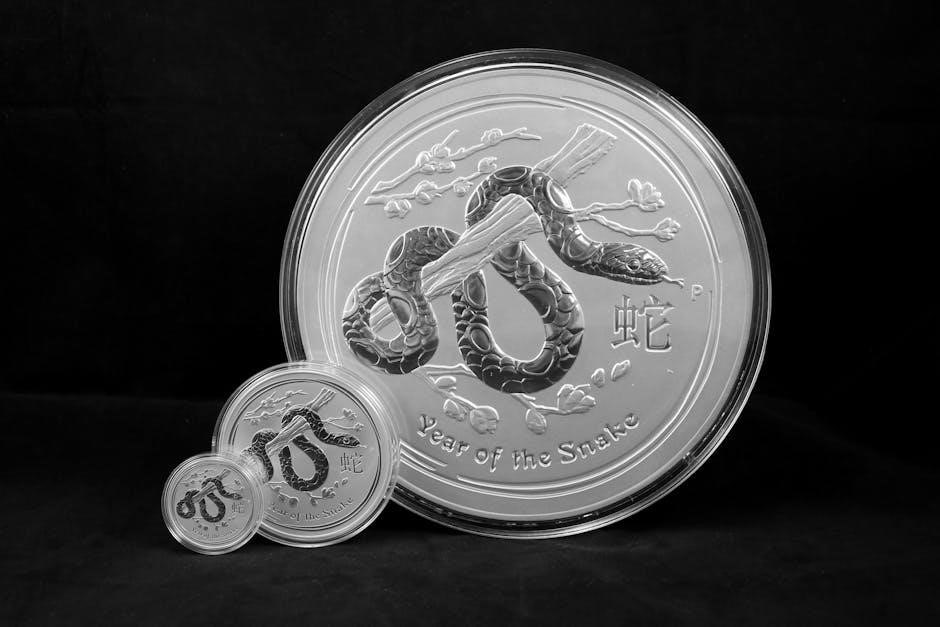
1․3 Benefits of Coin Collecting
Coin collecting offers numerous benefits, combining education, recreation, and potential financial rewards․ It fosters a deeper understanding of history, art, and global cultures, as coins often reflect the values and traditions of their issuing nations․ Collectors gain knowledge about monetary systems, economic shifts, and historical events․ The hobby also encourages patience, research skills, and attention to detail․ Additionally, coin collecting can serve as a smart investment, as rare or high-grade coins may appreciate in value․ It promotes social connections through clubs and events, creating a sense of community among enthusiasts․ Whether for personal enjoyment or financial gain, coin collecting is a rewarding and enriching pursuit that appeals to diverse interests and goals․
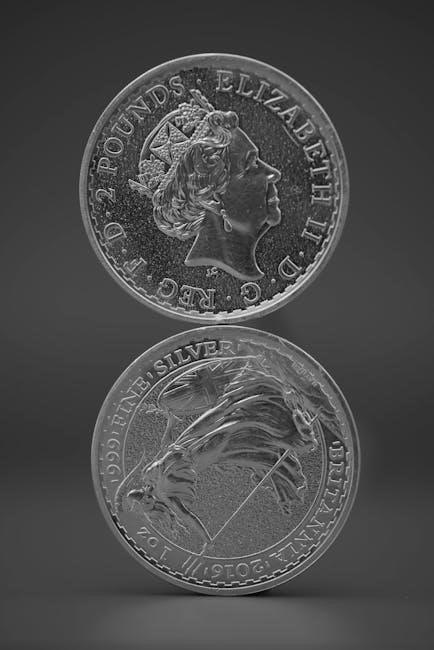
Building and Managing a Coin Collection
Building and managing a coin collection involves acquiring, organizing, and maintaining coins effectively․ It requires knowledge of tools, storage, and strategies to preserve and enhance your collection․
2․1 Where to Buy Coins
Coin collectors can acquire coins from various sources, including reputable dealers, numismatic auctions, and online marketplaces․ Specialty coin shops and coin shows are excellent for rare finds․ Auction houses like Heritage or Stack’s Bowers offer high-value coins, often with authentication․ Online platforms such as eBay or specialized forums provide convenience but require caution․ Additionally, bank rolls or commemorative sets from financial institutions can be cost-effective․ Joining collecting clubs or communities also offers opportunities to trade or purchase coins directly from fellow enthusiasts․ Always research sellers and authenticate coins to ensure quality and avoid counterfeits․ Building relationships with trusted sources is key to growing a valuable collection․
2․2 Tools and Accessories for Coin Collecting
To properly manage and maintain your coin collection, essential tools and accessories are required․ A magnifying glass or loupe is crucial for examining coin details․ Gloves prevent oils from your skin from tarnishing the coins․ Use a soft, dry brush to gently remove dirt or debris․ A coin album or folder provides organized storage and display․ Flips or coin holders are ideal for individual coins, offering protection and visibility․ A scale can help determine coin authenticity by verifying weight․ For advanced collectors, coin grading guides and reference manuals are invaluable․ These tools ensure your collection is preserved, studied, and admired effectively, while maintaining its value and condition over time․
2․3 Proper Storage and Maintenance
Proper storage and maintenance are vital to preserving the condition and value of your coin collection․ Use coin albums, folders, or airtight containers to protect coins from dust, moisture, and light․ Store coins in a cool, dry environment to prevent tarnishing․ Handle coins with gloves or by the edges to avoid transferring oils from your skin․ Regularly inspect coins for signs of damage or corrosion and clean them gently with a soft brush if necessary․ Avoid exposing coins to direct sunlight or extreme temperatures․ For long-term preservation, consider using archival-quality materials and keep your collection organized for easy access and maintenance․ Proper care ensures your coins remain pristine and retain their value over time․
Advanced Strategies for Coin Collectors
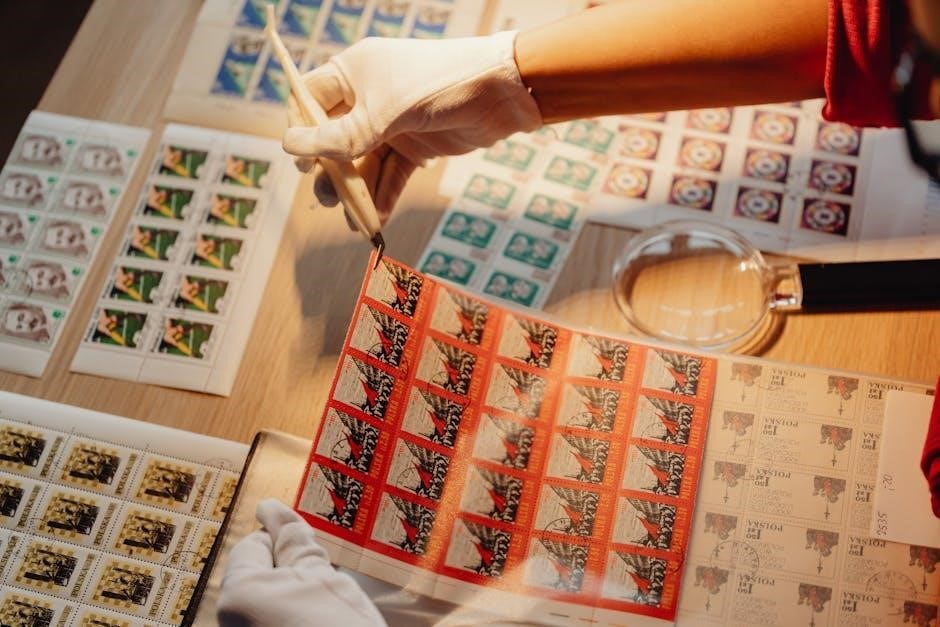
Advanced collectors focus on rare coins, master grading systems, and refine their trading skills․ Building a diverse portfolio and staying updated on market trends enhances their collecting journey and success․
3․1 Identifying Rare and Valuable Coins
Identifying rare and valuable coins involves understanding factors like limited mintage, historical significance, and condition․ Coins with unique designs or errors, such as misprinted dates, can also be valuable․ Grading systems and certifications from reputable third parties are crucial for verifying authenticity and condition․ Researching market trends and demand helps determine a coin’s worth․ Networking with experts and using specialized catalogs can aid in spotting rare finds․ Additionally, historical context and the story behind a coin can enhance its value․ By combining these elements, collectors can identify and appreciate rare and valuable coins effectively, making informed decisions to build a valuable collection․
3․2 Understanding Coin Grading Systems
Coin grading systems evaluate a coin’s condition, authenticity, and value․ Most systems use a numerical scale, such as 1 to 70, with higher numbers indicating better preservation․ Descriptions like Poor, Fine, and Mint State provide additional clarity․ Third-party grading services, like PCGS or NGC, offer impartial assessments and encapsulate coins in tamper-evident slabs․ These services enhance trust and transparency in the market․ Grading standards consider factors like luster, strike quality, and surface imperfections․ Accurate grading is crucial for determining a coin’s market value and desirability․ Collectors and investors rely on these systems to make informed decisions, ensuring fairness and consistency in coin evaluations and transactions․
3․4 Selling and Trading Coins
Selling and trading coins can be a lucrative way to monetize your collection or exchanged for other desirable coins․ Reputable platforms like eBay, coin shows, and specialized forums connect buyers and sellers․ Professional grading from services like PCGS or NGC ensures authenticity and fairness․ To maximize value, research market demand and set competitive prices․ Consider auction houses for rare coins, as they often attract serious bidders․ When trading, negotiate terms clearly to ensure both parties are satisfied․ Always provide detailed descriptions and high-quality images to build trust․ Transparency about a coin’s condition and history is essential for smooth transactions․ Selling and trading efficiently requires patience, knowledge, and strategic planning to achieve the best outcomes for your collection․
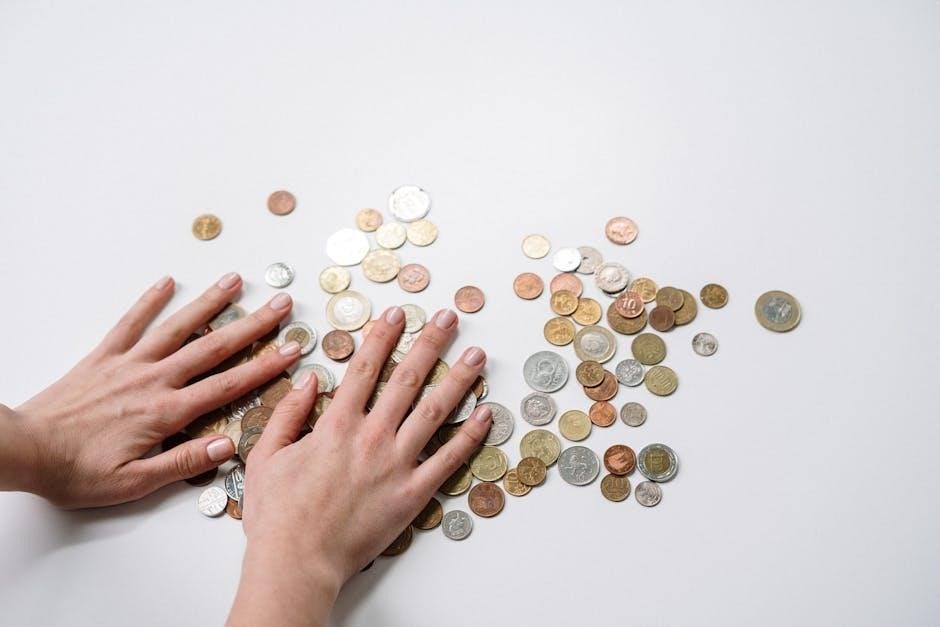
Coin Collecting Cheat Sheet: Key Tips
Start small, research thoroughly, and use trusted resources․ Avoid overpaying, store coins properly, and stay organized․ Build relationships with dealers and join collector communities for support and insights․
- Stay informed about market trends․
- Focus on quality over quantity․
- Keep records of purchases and sales․
4․1 Essential Resources for Collectors
Essential resources for coin collectors include price guides, auction catalogs, and numismatic journals․ Online platforms like PCGS and NGC provide grading standards and market insights․ Joining coin clubs and forums connects collectors globally, offering tips and advice․ Dealer directories and collector communities are invaluable for networking and learning․ Additionally, reference books and cheat sheets provide quick access to key information, helping collectors make informed decisions․ Utilize these tools to enhance knowledge and build a successful collection․ Always verify sources for accuracy and reliability to avoid costly mistakes․ Staying informed ensures a enjoyable and rewarding hobby․
4․2 Avoiding Common Mistakes
Avoid overpaying for coins by researching market values and consulting price guides․ Never purchase without proper authentication to avoid counterfeit coins․ Store coins in a cool, dry place to prevent damage from moisture and chemicals․ Be cautious of overly polished or cleaned coins, as this can reduce their value․ Do not ignore the importance of coin grading, as it significantly impacts value․ Avoid buying from unreliable sources or dealers with poor reputations․ Keep detailed records of purchases and sales for tracking and tax purposes․ Stay patient and do not rush into buying rare coins without thorough inspection․ Lastly, avoid focusing solely on trends—collect what genuinely interests you for long-term satisfaction․
